 Petzlover
Petzlover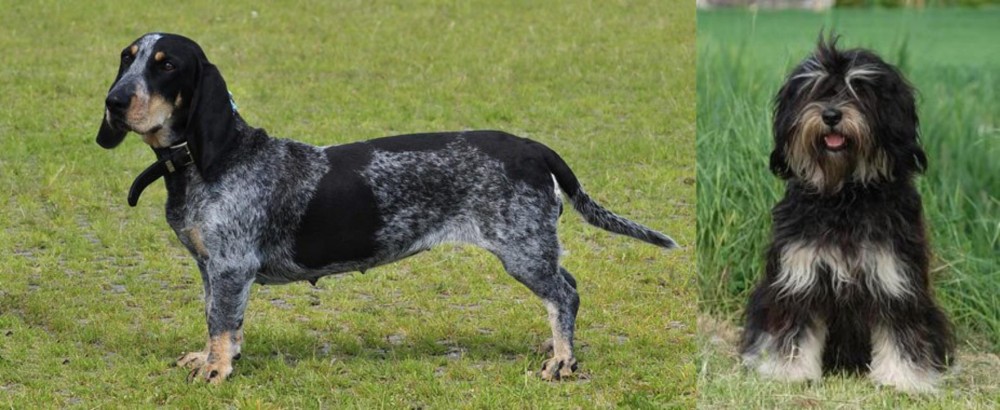 Basset Bleu de Gascogne is originated from France but Cao da Serra de Aires is originated from Portugal. Basset Bleu de Gascogne may grow 17 cm / 6 inches shorter than Cao da Serra de Aires. Basset Bleu de Gascogne may weigh 9 kg / 19 pounds lesser than Cao da Serra de Aires. Both Basset Bleu de Gascogne and Cao da Serra de Aires has almost same life span. Both Basset Bleu de Gascogne and Cao da Serra de Aires has almost same litter size. Both Basset Bleu de Gascogne and Cao da Serra de Aires requires Moderate Maintenance.
Basset Bleu de Gascogne is originated from France but Cao da Serra de Aires is originated from Portugal. Basset Bleu de Gascogne may grow 17 cm / 6 inches shorter than Cao da Serra de Aires. Basset Bleu de Gascogne may weigh 9 kg / 19 pounds lesser than Cao da Serra de Aires. Both Basset Bleu de Gascogne and Cao da Serra de Aires has almost same life span. Both Basset Bleu de Gascogne and Cao da Serra de Aires has almost same litter size. Both Basset Bleu de Gascogne and Cao da Serra de Aires requires Moderate Maintenance.
 The Basset Bleu de Gascogne is an old breed and also one of the most reserved of the Basset family. The Basset Bleu de Gascogne’s history can be traced back to the 14th century, originating in the region of Gascony, France. At one time there were very few of these dogs and Alain Bourbon began doing something about this in the early 20th century, although he didn’t document his breeding practices . There are theories though and one was that he bred a few of the very first Basset Bleu de Gascognes with the Basset Saintongeois and the Grand Bleu de Gascogne.
The Basset Bleu de Gascogne is an old breed and also one of the most reserved of the Basset family. The Basset Bleu de Gascogne’s history can be traced back to the 14th century, originating in the region of Gascony, France. At one time there were very few of these dogs and Alain Bourbon began doing something about this in the early 20th century, although he didn’t document his breeding practices . There are theories though and one was that he bred a few of the very first Basset Bleu de Gascognes with the Basset Saintongeois and the Grand Bleu de Gascogne.
Today the Basset Bleu de Gascogne is rarely found anywhere beyond France’s borders and there are only a few clubs for the Basset Bleu de Gascogne.
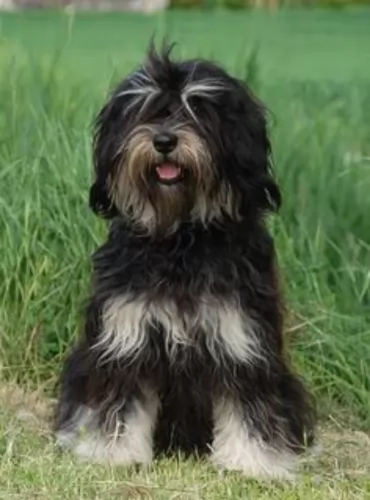 Ancestors of the Cao da Sera de Aires were used for herding livestock in the Serra de Aires and Alentejo, Portugal. This herding dog is native to Portugal and throughout the 20th Century he was kept as a working dog.
Ancestors of the Cao da Sera de Aires were used for herding livestock in the Serra de Aires and Alentejo, Portugal. This herding dog is native to Portugal and throughout the 20th Century he was kept as a working dog.
Known also as the Portuguese Sheepdog, Portuguese Shepherd Dog or Serra de Aires Mountain Dog, there are some questions surrounding the breed's ancestry as there are few records of dogs before 1900. The dog is thought to be related to the Pyrenean and Catalan Sheepdogs and that it has descended from Briards which were imported into Portugal and crossed with the Pyrenean Sheepdog.
The Cão da Serra de Aires breed standard was accepted by the Portuguese Kennel Club, and the breed was recognized internationally in 1996. The dog was also recognized by the United Kennel Club in the Herding Group in 2006.
 The Basset Bleu de Gascogne today is a striking looking hound, and is the most reserved o the Basset breeds. When you look at him, their general appearance is large but not too heavy. Long of build, his height at the withers is about 30 – 38cm, and he weighs up to 18kg.
The Basset Bleu de Gascogne today is a striking looking hound, and is the most reserved o the Basset breeds. When you look at him, their general appearance is large but not too heavy. Long of build, his height at the withers is about 30 – 38cm, and he weighs up to 18kg.
He has short legs, thick bones, long floppy ears and dark brown, sad eyes, but is still agile and able to get around quickly. This particular Basset has a short, smooth, dense coat which is black with a white mottled pattern and some tan marking around the feet and face. You’ll most times notice black patches over his ears and sides of his head and there will typically be a white blaze on his skull.
The attractive Basset Bleu de Gascogne is one of 6 Basset Hound breeds, and this one is an energetic, lively dog who possesses a great sense of smell. Easy to train, he slots in well with his human family, wanting to please them all the time. They just love his dark, sorrowful brown eyes and the gentle expression on his face. With his deep bark, he tries to talk to his family. He is fairly easy to train, and with socialization and training he makes an exceptional pet.
Perhaps one aspect of the Basset family that doesn’t go down well with dog owners is their wandering nature. As a scenthound, he often gets the scent of something and wants to put his nose down and follow it. If you haven’t got a sturdy wall or fence around your property, he’ll just wander off.
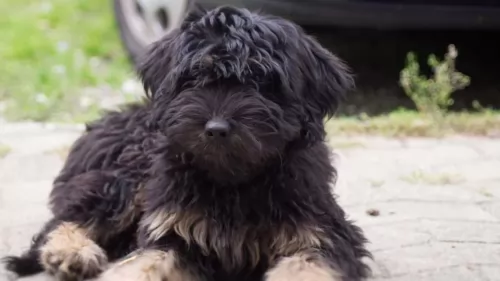 The beautiful Cão da Serra de Aires is a medium-sized dog. He stands at 45 to 55 cm at the withers and weighs about 17 to 27 kg. He is recognizable by the long, shaggy, single-layer coat, of straight or slightly wavy hair. Don’t be deceived by the coat as below, the dog has a muscular, athletic body.
The beautiful Cão da Serra de Aires is a medium-sized dog. He stands at 45 to 55 cm at the withers and weighs about 17 to 27 kg. He is recognizable by the long, shaggy, single-layer coat, of straight or slightly wavy hair. Don’t be deceived by the coat as below, the dog has a muscular, athletic body.
The coat comes in different shades such as fawn, gray, yellow and black. The dog has a long tail which is held straight out or down and he has medium-length, floppy ears. You’ve got to look hard, as the facial features of the dog are hidden by its shaggy coat. He has a lot of facial hair that sometimes you have to wonder if he can see out of his eyes.
The Cao da Serra de Aires is a wonderful canine companion and is devoted and loyal, forming strong bonds with their human family. He is a playful, amicable dog and gets on well with children in the home as well as with other pets.
He is intelligent and trainable, and when properly trained and socialized,he becomes an even nicer pet to have around and is obedient to his master’s voice. He is territorial, strong willed and dominant and makes a good watchdog too.
 This smooth-coated breed with his low-set ears, his sad eyes, out-turned paws and gentle but intelligent pet make this dog an awesome, companionable pet. He is loyal, affectionate and devoted. They’re good with children and other pets, and can even make superb pets for older- or frail people who may lead a more sedentary lifestyle.
This smooth-coated breed with his low-set ears, his sad eyes, out-turned paws and gentle but intelligent pet make this dog an awesome, companionable pet. He is loyal, affectionate and devoted. They’re good with children and other pets, and can even make superb pets for older- or frail people who may lead a more sedentary lifestyle.
The Basset Bleu also sheds a bit less than their Basset Hound counterparts, although they do tend to shed throughout the year. He will require training, just like any dog really, but you don’t want to be harsh with training, as he is a gentle, sensitive dog.
Laid back, this dog which has always been an excellent hunter in days gone by, will make anyone a devoted, loyal friend.
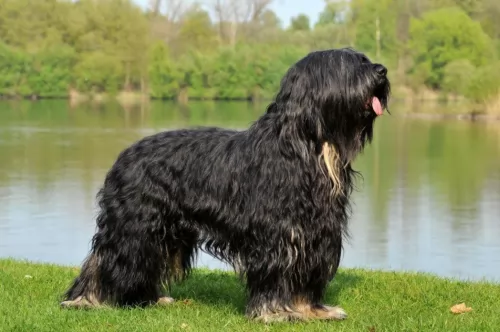 The Cão da Serra de Aires is such a loyal dog to his human family that he makes a splendid pet. He is active, having worked historically at herding and guarding.
The Cão da Serra de Aires is such a loyal dog to his human family that he makes a splendid pet. He is active, having worked historically at herding and guarding.
Socialization and obedience training ensure that he becomes an exceptional pet and he has a host of positive attributes to his name – he is intelligent, energetic, loyal and loving. He may have been used long ago to guard livestock, but today he is selected as a pet specifically for his excellent companionship and for his protective nature.
 A great aspect with Basset Bleus is that they have very few health issues and are quite laid back. They can easily get to 14 years of age and older with good nutrition and exercise. Nothing is set in stone however, and every breed can suddenly develop health problems.
A great aspect with Basset Bleus is that they have very few health issues and are quite laid back. They can easily get to 14 years of age and older with good nutrition and exercise. Nothing is set in stone however, and every breed can suddenly develop health problems.
Dogs like this with a deep chest can be prone to a condition known as gastric dilatation volvulus or bloat. This is a condition not to be taken lightly as it can be life threatening. Gastric dilatation volvulus means twisted stomach because of excessive gas or flatulence and your dog will require prompt treatment.
 As with most dogs that are looked after well, their health can be good. The Cao da Serra de Aires isn’t likely to keep you at the vet often. Just like with any good dog, there are some health disorders that can benefit you to know about.
As with most dogs that are looked after well, their health can be good. The Cao da Serra de Aires isn’t likely to keep you at the vet often. Just like with any good dog, there are some health disorders that can benefit you to know about.
Being forewarned , you can get your pet to the vet quickly before the illness gets out of hand.
There are some pet owners who want to have their pets tested by the Orthopedic Foundation for Animals as well as the Canine Eye Registration Foundation to rule out health defects such as hip dysplasia and cataracts before they manifest themselves in their pets. This is of particular importance to breeders so as to prevent the parent dogs passing bad genetic conditions to the puppies.
This is a common skeletal disease where the dog’s hip joints don’t develop properly. It can be terribly painful for your pet to get around. It’s a genetic condition and while it is more prevalent in big dogs, any breeds are susceptible.
Your dog will battle along with painful joints and sometimes his hind-end will be lame. You’ll notice that once lying down, he battles to get up again. Fortunately vets are well acquainted with this ailment and they have different options to treat and manage it.
Cataracts in your dog come about from a disease process which affects the lens of the eye. The eye loses its transparency and impairs vision. There are some instances where cataracts can cause blindness. You’ll see a whitish gray area in your pets eye. The most common cause of cataracts is genetics. Get your pet to the vet who will do certain tests to evaluate the eyes and make a recommendation.
 With his short coat, shedding isn’t a huge issue with the Basset Bleu. He sheds seasonally and then you will definitely have to brush him at least twice a week to get rid of all that loose hair.
With his short coat, shedding isn’t a huge issue with the Basset Bleu. He sheds seasonally and then you will definitely have to brush him at least twice a week to get rid of all that loose hair.
Some dog owners don’t get used to the slobbering of these dogs. Certainly, you will need to change his drinking water often because of this slobbering of his. It can result in the water containing viruses and bacteria which can cause infections in your dog.
These dogs tend to be lazy at home, so it will be up to you to see that he gets a good quota of exercise to prevent him becoming fat and prone to more illnesses. The backs, especially with added weight, can cause problems and this kind of dog shouldn’t be encouraged to jump off beds and couches.
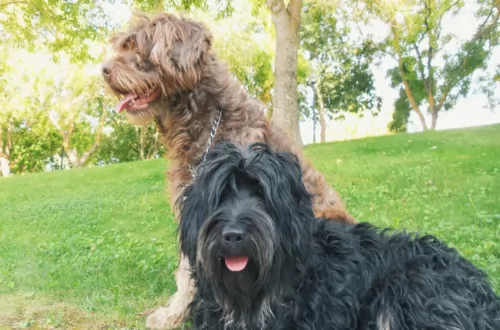 As a working dog used to long hours of action, the Cao da Serra de Aires will need lots of activity. He’ll need you taking him for long walks and playing ball games with him. He can become frustrated and destructive when left without any physical stimulation.
As a working dog used to long hours of action, the Cao da Serra de Aires will need lots of activity. He’ll need you taking him for long walks and playing ball games with him. He can become frustrated and destructive when left without any physical stimulation.
The Cao da Serra de Aires may have long hair but he isn’t high maintenance. He won’t require professional grooming, but will require a good brush a least twice a week. This is because the long coat can tangle.
To keep him looking his best, you’ll want to be trimming the hair around his paws. Another important grooming task is checking his ears and cleaning them. You have to be careful about cleaning your pet ears if you don’t know how, as it could damage the ears. Your vet can always advise you on how this is done.